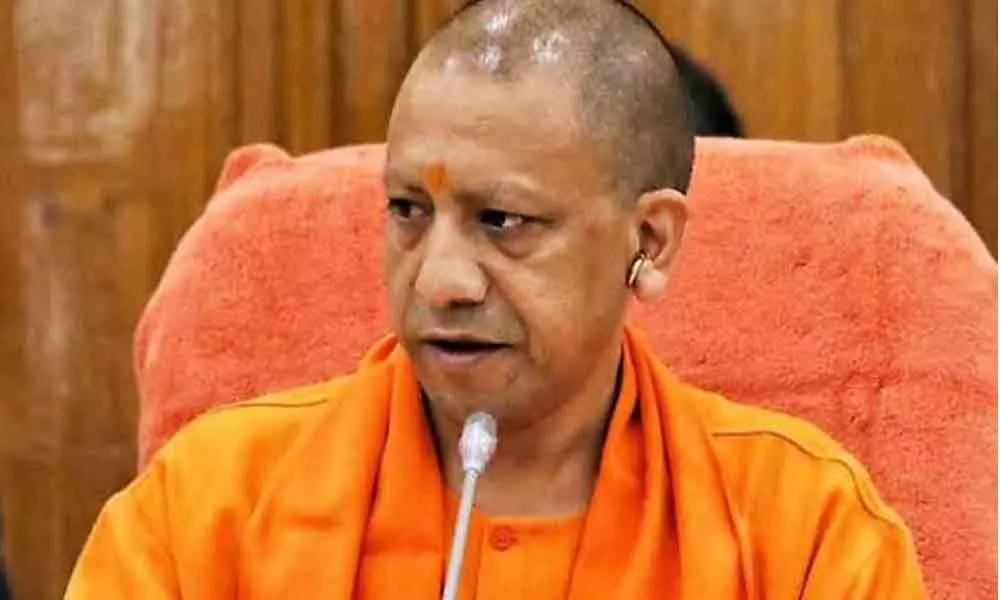Live
- NCC Day grandly celebrated at SITAM
- CITU demands rollback of strategic sale of VSP
- 7-Year-old girl sexually assaulted in Tirupati
- PM Modi highlights govt's efforts to make Odisha prosperous and one of the fastest-growing states
- Hezbollah fires 200 rockets at northern, central Israel, injuring eight
- Allu Arjun's Family Appearance on Unstoppable with NBK Breaks Viewership Records
- Unity of hearts & minds essential for peace & progress, says J&K Lt Governor
- IPL 2025 Auction: I deserve Rs 18 cr price, says Chahal on being acquired by Punjab Kings
- EAM Jaishankar inaugurates new premises of Indian embassy in Rome
- Sailing vessel INSV Tarini embarks on second leg of expedition to New Zealand
Just In
Will Yogi be the next PM if he wins UP in 2022?


Yogi Adityanath
As Prime Minister Narendra Modi turned 71, there is a growing debate on whether he will remain at the helm of the government even after 2025 or will Yogi Adityanath succeed him?
As Prime Minister Narendra Modi turned 71, there is a growing debate on whether he will remain at the helm of the government even after 2025 or will Yogi Adityanath succeed him? This question may sound premature. By the time the country goes to polls again, Modi would be 73 and hence he can be once again sworn in as Prime Minister.
The unwritten rule of BJP is that leaders should not hold any organisational positions after 75. If this rule is to be strictly followed, then Modi will have to step down in 2025. Hence a discussion is on in the inner circles of the saffron party.
It is generally felt that Amit Shah who is seen as eyes and ears of Modi is being trained to be his successor. But the similarities between Modi and Adityanath are many more. Both have grown in party on their own strength. Both have been rabble rousers; both are good orators and both have the ability to connect with the people more than any other leader in the BJP.
A lot of course would depend on the Uttar Pradesh Assembly elections next year. Despite incidents like the Lakhimpur where the union minister's son had run over some farmers, for the present at least, the situation appears to be that BJP will be back in power though with reduced majority.
The fate of any party would depend a lot on the Brahmin votes. Brahmins constitute over 12 per cent of the total population and hence all political parties are trying to woo the Brahmin and Dalit communities in the name of social engineering.
In 2007 elections Mayawati had been successful in winning 206 seats out 403 by bringing together Dalit, Brahmin, OBCs and Muslims and wants to try the same experiment once again. But analysts say that this time the Brahmins appear to be sailing with BJP. If one looks at the political history of UP, the state after Independence had seen five Brahmin Chief Ministers. Moreover, Brahmins in UP generally go with the party that may to come to power. They are considered as floating vote bank. They had voted for Mayawati in 2007 but when they realised that the BSP did not fulfil its promises, they supported Akhilesh Yadav in 2012.
Unhappy with the SP using them more as vote bank, they went with the BJP in 2014 and 2017. Another interesting aspect that needs to be looked at is that from 2019 the non-Yadav and non-Kurmi OBCs have deserted the BSP and SP to vote for the BJP.
In the backdrop of this scenario, UP elections and victory of Adityanath Yogi assumes importance. Analysts feel that if Yogi comes back to power in UP, he would certainly emerge as the next main leader in BJP. There are many similarities between Modi and Yogi. Like Modi he is a strong leader. He is both feared and respected. He has full grip over administration. He is a staunch Hindutva leader and five time MP from Gorakhpur. He does not belong to the English-spouting elite class but has emerged an icon of middle class Hindutva leader and is most envied by the CMs of other states. Like Modi, he lives alone. He is unmarried and can't be faulted for wanting to earn money or privileges for a family. He does not live with his parents either.
Like Modi nothing moves without his consent and no one can cross his path, not even the media. Silencing opponents and media is something that is seen in almost all states more since 2014. This however is a dangerous trend for the country which needs to be fought against. Dissent is the right of every individual in a healthy democracy.

© 2024 Hyderabad Media House Limited/The Hans India. All rights reserved. Powered by hocalwire.com






